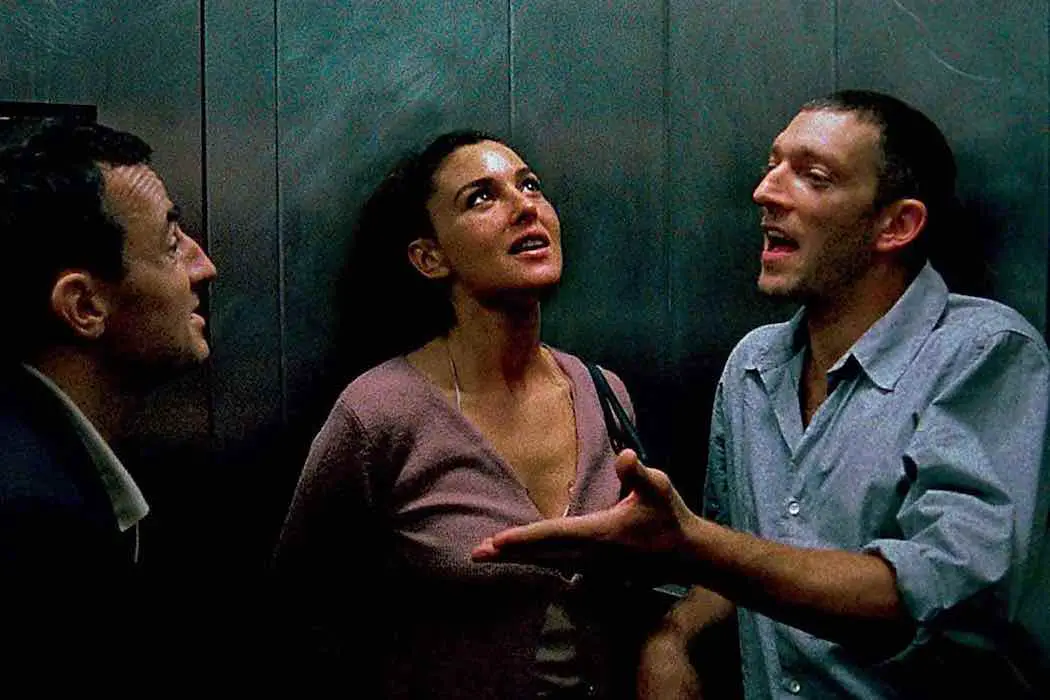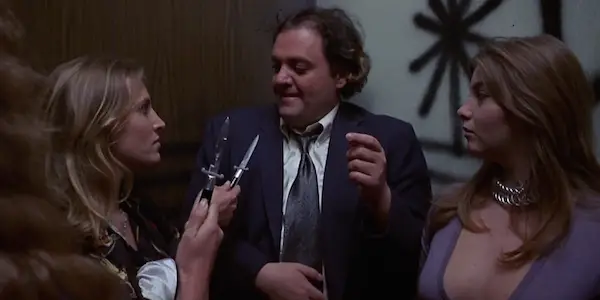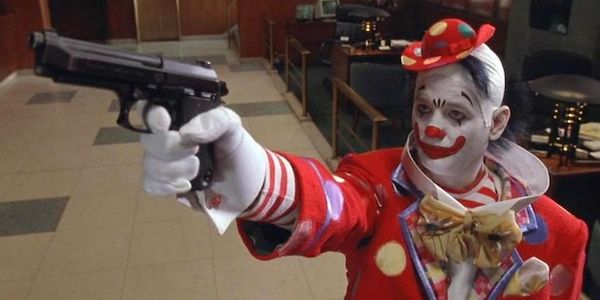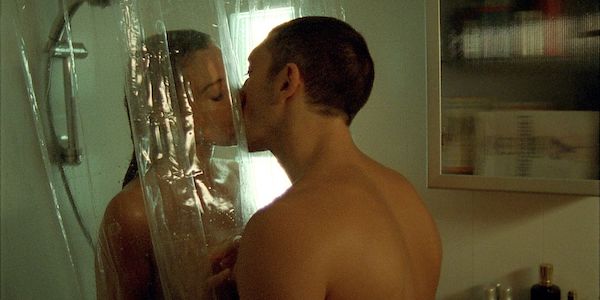Video Dispatches: DRIVE, SWITCHBLADE SISTERS, QUICK CHANGE, and IRREVERSIBLE

Movie lover & Los Angeles-based writer. BA in Film Criticism…
Video Dispatches is a regular column covering recent home video releases.

DRIVE (1997) – MVD REWIND
Before Ryan Gosling and Nicolas Winding Refn teamed up to make 2011’s Drive, creature designer and make-up artist Steve Wang directed a film called Drive. Released direct-to-video in 1997, Drive concerns a man named Toby Wong (Mark Dacascos), a special agent who has fled from Hong Kong to the United States. Toby’s heart is outfitted with an implant that effectively makes him a supersoldier, granting him impressive feats of strength and agility. This also makes him a target for the Evil Corporation that wants their implant back, tasking cowboy assassin Vic Madison (John Pyper-Ferguson) to hunt Toby down.
Evading capture, Toby encounters Malik (Kadeem Hardison), a recently single songwriter, who offers to take Toby to LA to get the implant out. Along the way, they are joined by Deliverance (a delightfully daffy Brittany Murphy), an eccentric gal who runs a motel. As Vic and his associates close in, a new supersoldier is dispatched, determined to put Toby down for good.
Blending buddy cop and road movie, the plot that drives Drive is ultimately pretty perfunctory. The film’s raison d’etre is its remarkable action set-pieces, with Wang out to make the definitive martial arts actioner of the 90s. Drawing influences that range from Shaw Bros. films to the works of Jackie Chan, the action in Drive is clean, inventive, and beautifully choreographed, sold with the impressive physicality of star Dacascos (who performed most of his own stunts). The film’s climax, which pits him against the enemy supersoldier and a team of henchmen on dirtbikes in a futuristic nightclub, is truly a sight to behold. He clearly should have been a household name after this.
Virtually unavailable on any home video platform in the United States, MVD Rewind has now brought the full Drive experience to a brand spanking new Blu-ray release. MVD has provided two copies of the film: the preferred director’s cut, and the shortened producer’s cut, the latter of which was unwatched by me for this review. In the behind-the-scenes doc “The Force Behind the Storm,” Wang laments the truncated version, which cuts out many character moments to get to each action beat as quickly as possible (the music score has also been completely altered). Dacascos states that while the Producer’s Cut still technically “works,” you get the full Drive experience with the Director’s Cut.
Also included is a feature-length commentary, featuring Wang, Dacascos, Hardison, and stunt coordinator Koichi Sakamoto. This track oscillates between informative and jocular, with the four men clearly enjoying each other’s company as they share BTS tidbits and admire what’s on the screen before them. It is an enjoyable listen, overall. The disc is rounded out by interviews between the key players, a handful of deleted scenes, and a trailer. The print quality of the film looks great and is generally free of any issues – this is most certainly the best Drive has ever looked. Fans of the film would do very well to pick up a copy of this; for everyone else, the film is highly worth seeking out, if only for the incredible action sequences alone.

SWITCHBLADE SISTERS (1975) – ARROW
The latest film from Quentin Tarantino’s prestigious Rolling Thunder DVD label to receive a Blu-ray upgrade is Jack Hill’s Switchblade Sisters, having now been released by Arrow Films in the US and the UK. It’s no wonder QT is fond of this classic, as several elements have been clearly influenced his own works (namely Kill Bill, or even Mrs. Mia Wallace’s aborted Fox Force Five pilot, as it were). Hill’s film follows an all-girl high school gang known as the Dagger Debs, led by the feisty Lace (Robbie Lee, in a performance accurately described by Hill on the features as “James Cagney-esque”). Armed with the titular switchblades, the girls have a run-in with a repo man that results in them being put being in a juvenile detention center, along with outsider Maggie (Joanne Nail), who got caught up in the scrap.
But Maggie proves to be capable herself, joining the Debs once they are released. Back on the streets, the gals find that a new gang, run by nefarious Crabs (Chase Newhart), have taken control, operating a small militia on the school grounds. The Debs plot to strike back against Crab’s gang, while Lace and Maggie vie for control of the Debs’ leadership. The film features a shootout at a roller rink, an assault with an armored car, and a vicious knife fight between gang leaders.
Arrow’s video transfer is reliably strong, retaining the grit and grain of the film’s source, underlining the Grindhouse feel of the proceedings. Headlining the bonus features is a commentary by film critics and podcasters Samm Deighan and Kat Ellinger. A valuable listen, especially in regards to the film’s feminist elements and Hill’s background as a filmmaker. Fans of Switchblade Sisters might also want to seek out the aforementioned Rolling Thunder DVD (or the German Blu-ray, released in 2016), which features a commentary between Hill and Tarantino that is not featured on this release.
A series of making-of and archival interviews are included, the best of which being “We’re the Jezebels,” a doc that includes participation from Hill, Nail, and a few other cast and crew members. A booklet is also included. Arrow has done a fine job bringing Switchblade Sisters to Blu-ray – fans and newbies should be pleased.

QUICK CHANGE (1990) – WARNER ARCHIVE
What is the best Bill Murray movie? Groundhog Day, some might say. Lost in Translation, for some others. And a loud vocal majority would certainly want the legacy of Ghostbusters to be heard. There is certainly a wide array of choices, all potentially acceptable answers. But what about 1990’s Quick Change, the near-forgotten crime comedy co-directed by Murray himself?
On one day in Manhattan, a man named Grimm (Murray), dressed in a full clown suit and armed with a gun and some dynamite, carries out a plan to rob a bank in broad daylight. Making a clean getaway with help from accomplices Phyllis (Geena Davis) and Loomis (Randy Quaid), Grimm and co. make a mad dash to the airport to abscond with their stolen earnings. Hot on their trail is Chief Rotzinger (Jason Robards), a veteran of the NYPD and gung-ho to bring the criminals to justice. Time is not on the side of the three criminals, who must outwit cops, gangsters, and crazed taxi drivers to catch their impending flight.
Thirty years later, it’s a shame that Quick Change remains so criminally underseen. Co-directed by Howard Franklin, the film fits Murray’s sardonic sensibilities like a glove, with the first act, staged entirely in and around the bank heist, containing some of the actor’s finest moments. The rest of the film holds up too, with the trio of robbers making a mad dash through the inescapable hell that is New York City, pursued by a ravenous Robards, bringing gravitas to his antagonistic role. Also of tragic note is the fact that this marks the beginning and end of Murray’s directorial career, a reminder of how sharp he could be when palpably engaged with the material. For anyone looking for a lost comedy gem, it doesn’t get better than this.
Unfortunately, while Warner Bros. has done a great job of transferring the film to Blu-ray (audio and video quality are outstanding), they have neglected to include any special features on the disc. The only thing available is a single theatrical trailer. But don’t let that discourage you – this release comes highly recommended based on the strength of the film alone, given its previous availability and general obscurity.

IRREVERSIBLE (2002) – INDICATOR SERIES
“To avoid fainting, keep repeating: ‘It’s only a movie. Only a movie. Only a movie…’” This mantra, originally attributed to the marketing campaign for Wes Craven’s 1972 shocker The Last House on the Left, suggests that no matter how intense the viewing experience on any given film gets, we must remind ourselves that it’s all purely a work of fiction, and no harm will come to us, the audience. But what if said film is expressly designed to actively assault you while you watch it?
A literal shock to the system hailed as a masterpiece by some, deemed borderline unwatchable by others, Gaspar Noe’s Irreversible immediately grabs viewers by the throat and practically dares them to look away, less they gaze upon the unrelenting horrors that befall its three main characters. The characters in question are Alex (Monica Bellucci), Marcus (Vincent Cassel), and Pierre (Albert Dupontel), three friends who head off to a party one evening in Paris. Alex leaves early, resulting in her being brutally raped in an underpass by a vicious pimp known as Le Tenia (Jo Prestia). Marcus and Pierre track Le Tenia down to a gay BDSM nightclub called “The Rectum,” where Marcus is beaten unconscious, and Pierre crushes the assailant’s head with a fire extinguisher. The two are taken away by emergency medical services and the police, respectively, and the story ends.
Of course, we don’t see the action play out in this order. The central conceit behind Irreversible is its reverse chronological structure. Comparisons are inevitably made to Memento, released just two years prior, but unlike Nolan’s film, which alternates between a backward and forwards progression before finally meeting in the middle, the entirety of Irreversible is told in reverse chronological order, meaning that each scene ends where the preceding scene immediately began. Thus, this “rape-revenge” film becomes a “revenge rape” film, and chaos transforms into order.
Two sequences encapsulate the film’s reputation. The first is the infamous “fire extinguisher” sequence, where an enraged Pierre uses the safety device to obliterate a man’s skull with sickeningly realistic results. The second, and more notorious, is the 9-minute rape sequence, where Alex is viciously raped and then severely beaten within an inch of her life, all captured in a single, unbroken camera take.
Noe has fashioned himself an enfant terrible as of late, recently turning out less effective works like Love and Climax. Irreversible serves as a potent reminder of how bracing a filmmaker can be when he strives to go beyond just being provocative. If you’ve made it this far into the review without feeling sickened by what you’ve read, you may be one of a select few. Ever since its premiere at Cannes, Irreversible has inspired great disgust, scorn, and controversy, with many dismissing it as insufferable, hateful, misogynistic, and homophobic trash. While I sympathize with anyone unable to sit through the film, I cannot partake in their sentiments.
For one thing, the film is a technical marvel, with Noe, working alongside cinematographer Benoit Debie, employing a freewheeling camera that is seemingly unbound to any laws of earth, spinning from sequence to sequence with effortless grace. The immersive sound design (featuring a soundtrack by Thomas Bangalter, better known as one half of Daft Punk) is equally impressive, with the trip into The Rectum a genuine journey into hell, characterized by a nightmarish and persistent grinding noise (Noe also liberally employs a 28 Hz frequency on the film’s soundtrack, which reportedly inspired many of the hundreds of walkouts at Cannes and likely other subsequent theatrical exhibitions). And unlike his later films, Irreversible sports real thespian heft, with its trio of leads delivering phenomenal performances (Bellucci, in particular, must be commended for making the pain in every interminable minute of the rape sequence feel completely credible).
For a film as mighty as this, Indicator has pulled out all the stops to give Irreversible the definitive home video package. First up: the film has undergone a 2K restoration, overseen by Noe, which has very strong results in terms of color and clarity (considering the conditions of the shoot, this is likely going to be the best the film will ever look on Blu-ray). A second disc is offered with a “Straight Cut,” offering viewers the choice to watch the film in its proper, chronological sequencing. I have not watched this, as I feel it would rob the film of all of its power, but it is available for those interested. Next, there’s “The Irreversible Odyssey,” a series of interviews with Noe, Bellucci, Cassel, Dupontel, Prestia, Debie, and others, tracing the origins of the film through its production to its release in Cannes (reactions from the festival are included). Two archival audio-only interviews are also featured: an NFT50 Q&A with Bellucci, Cassel, and Noe, and a BFI Masterclass with Noe.
More enticing is the SFX reel, where visual effects supervisor Rodolphe Chabrier breaks down a lot of incredible trickery used to pull off Noe’s vision, with extended time given to the head-smashing sequence (which featured a combination of live actor, latex dummy, and a 3D-generated head). Also of great interest is a breakdown of the film’s chronology (comparing the Theatrical cut to the Straight Cut) and rape scene by critic Alexandra Heller-Nichols. An audio commentary by Noe (ported over from previous releases), an 80-page booklet, eight trailers, a pair of music videos, an image gallery, a lone deleted scene, and Intoxication, a short documentary Noe directed around the same time as Irreversible, are also included. The entire set comes in Indicator’s typically gorgeous packaging. Be forewarned: this film is most certainly not recommended as a blind buy, and even those who have seen it may be unlikely to return to it ever again. Proceed with caution.
What recent home video acquisitions have you made? Let us know in the comments below!
Does content like this matter to you?
Become a Member and support film journalism. Unlock access to all of Film Inquiry`s great articles. Join a community of like-minded readers who are passionate about cinema - get access to our private members Network, give back to independent filmmakers, and more.
Movie lover & Los Angeles-based writer. BA in Film Criticism & Media Theory from CSU Northridge. Unofficial Bond ally. Rhymes with “tequila.”













